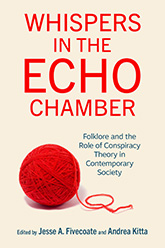|
Whispers in the Echo Chamber
Folklore and the Role of Conspiracy Theory in Contemporary Society
Edited by Jesse A. Fivecoate and Andrea Kitta
“A substantial contribution that makes the important point that conspiracy theories are traditional and performative—a form of folk narrative. Showing these linkages gives this volume a particular power.”
—Gary Alan Fine, author of Tiny Publics: A Theory of Group Culture and Action
Calling on folklorists to engage more fully with conspiracy theories
Whispers in the Echo Chamber: Folklore and the Role of Conspiracy Theory in Contemporary Society makes the case that conspiracy theories are fundamentally a folklore genre, akin to and often involving other belief narratives like rumor and legend. The editors and contributors show that studying conspiracy theories using the tools of folkloristics is a fruitful and necessary analytical exercise. The volume’s three parts lay out folkloristic approaches to conspiracy theories; ways folkloristics can help us understand how conspiracy theories are constructed; and how the genre of conspiracy theories interacts with particular, contemporary political contexts.
Jesse A. Fivecoate and Andrea Kitta’s timely volume complements studies from political science, sociology, psychology, history, and more, while also crucially calling for the field of folklore studies to engage more fully with conspiracy theories as a genre. Focusing on modern iterations of sometimes quite ancient conspiracy motifs and themes, the volume forcibly illustrates the crucial relevance of this prevalent and influential form of folklore in today’s interconnected world.
Jesse A. Fivecoate, a folklorist and sociocultural anthropologist with a PhD from Indiana University, studies the use of communal belief narratives that circulate within a group as a way of remembering and discussing episodes of conflict and crisis. He is a coeditor of Advancing Folkloristics.
Andrea Kitta is a folklorist and a professor of multicultural and transnational literature in the Department of English at East Carolina University. She is the author of Vaccinations and Public Concern in History: Legend, Rumor, and Risk Perception and The Kiss of Death: Contamination, Contagion, and Folklore as well as a coeditor of Diagnosing Folklore: Perspectives on Health, Trauma, and Disability.
Praise
“This book is a welcome addition, enlarging and deepening our understanding of conspiracy theories: accusatory, vernacular products, shaped by our new media, that worryingly provide the wrong answers even to the right questions.”
—Véronique Campîon-Vincent, author of Organ Theft Legends
Table of Contents
Acknowledgments
Conspiracy Theory: A Folkloristic Introduction
Part I. Folkloric Approaches
1 What History Tells Us about QAnon
Bill Ellis
2 Interrogating “Conspiracism” and the Relationship between Historical and Contemporary Conspiracy
David Guignion
Theories
3 The SLAP Test and Conspiracy Theories about COVID-19, Bill Gates, and the Denver Airport
Jeannie Banks Thomas
4 QAnon in Four Pieces: Toward a Folkloric Understanding of a Superconspiracy
John Bodner
Part II. (De)Constructing Conspiracy Theories
5 Worse Than the Disease: The Mask Cartoons of Ben Garrison
Ian Brodie
6 Conspiracy Theories as a Form of Literature
Lisa M. Ruch
7 Computational Methods for the Study of Conspiracy Theories
Timothy R. Tangherlini, Shadi Shahsavari, Pavan Holur, and Vwani Roychowdhury
Part III. Circulation and Political Contexts
8 Conspiracy Thinking as Political Boundary Work: COVID-19 Conspiracy Narratives in Iran
Afsane Rezaei
9 I Tell My People the Truth: COVID-19 Conspiracy Theories and the Performance of Vernacular Authority in Religious Social Networks in Malawi
Anika Wilson
10 When a Demonology Meets Live-Action Role-Play: QAnon and the Creation of a Social Media Witch Scare
Sandra Grady
11 Can Narratives Counteract Conspiratorial Thinking?
Darin DeWitt and Matthew D. Atkinson
Contributors
Index
Of Related Interest
|

As Legend Has It
History, Heritage, and the Construction of Swedish American Identity
Jennifer Eastman Attebery |

Digital Legend and Belief
The Slender Man, Folklore, and the Media
Andrew Peck |
|

Larger images
January 2025
302 pp. 6 x 9
8 b/w illus., 1 table
|

